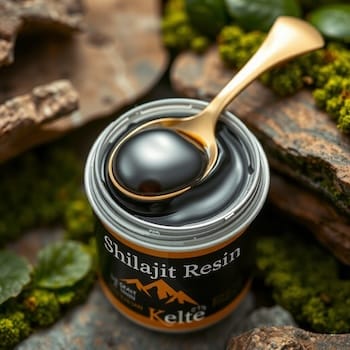Shilajit is a sticky, tar-like substance that forms over centuries from decomposed plant matter in the rocks of the Himalayas and other mountain ranges. It has been used in traditional Ayurvedic medicine for thousands of years and is believed to offer a wide range of health benefits. But does shilajit actually work? This article examines the scientific evidence behind 9 potential benefits of shilajit and how to use it safely.

Shilajit is a natural substance formed from the slow decomposition of plants over hundreds of years. It is found primarily in the rocks of the Himalayan mountains at altitudes between 1000-5000 meters. Shilajit contains over 80 minerals and is rich in fulvic acid, a potent antioxidant and anti-inflammatory compound.
In Sanskrit, shilajit means “conqueror of mountains and destroyer of weakness.” It has been used in Ayurvedic medicine for centuries as a rejuvenator and anti-aging compound. Today, shilajit is available as a dietary supplement in powder, resin, or capsule form.
Alzheimer’s disease is characterized by the buildup of tau protein in the brain. Research suggests the fulvic acid in shilajit may help prevent the abnormal buildup of tau protein and reduce inflammation, potentially slowing the progression of Alzheimer’s.
A 2023 study found that shilajit may act as a neuroprotective agent for Alzheimer’s disease. However, more clinical research is still needed to confirm these effects in humans.
Low testosterone can cause a range of symptoms in men like low sex drive, fatigue, and muscle loss. Shilajit appears to have a positive effect on testosterone levels.
In a clinical study, men aged 45-55 took 250 mg of purified shilajit twice daily for 90 days. At the end of the study, participants had significantly higher testosterone levels compared to placebo.
Chronic fatigue syndrome (CFS) is associated with mitochondrial dysfunction. Some research indicates shilajit may help boost energy production in cells.
A 2012 study on rats found that shilajit helped reduce the effects of chronic fatigue, likely by preventing mitochondrial dysfunction. While promising, human studies are still needed.
The fulvic acid and other compounds in shilajit have powerful antioxidant and anti-inflammatory properties. This may help protect against cellular damage and slow the aging process.
A 2022 review suggests shilajit and its compounds may have anti-aging effects, though more research is needed to confirm these benefits in humans.
Shilajit contains over 80 minerals and other beneficial compounds that may help the body adapt to high altitudes. It is thought to improve oxygen delivery and energy production in cells.
A 2010 review suggests shilajit may help counteract many symptoms associated with higher altitudes, though clinical studies are still lacking.
Shilajit contains high levels of humic acid and iron, which may help improve iron levels in the body. This could potentially benefit people with iron deficiency anemia.
An animal study found that rats given shilajit had higher levels of hemoglobin and red blood cells compared to anemic rats not given shilajit. Human trials are still needed.
Some research indicates shilajit may help improve sperm count and quality in infertile men.
In one study, 60 infertile men took shilajit twice daily for 90 days. At the end of the study, over 60% of participants showed an increase in total sperm count.
Animal studies suggest shilajit may offer some cardioprotective effects. One study on rats found that pretreatment with shilajit appeared to protect against drug-induced cardiac injury.
However, human studies are lacking. People with active heart conditions should avoid taking shilajit without medical supervision.
Shilajit appears to have positive effects on bone health, particularly in postmenopausal women who are at higher risk for bone loss.
A 2022 clinical trial found that daily shilajit supplementation helped improve bone mineral density in postmenopausal women with osteopenia.
Shilajit is available in several forms:
The recommended dosage can vary based on the form and concentration. Generally, 300-500 mg per day is considered a standard dose. Always follow the instructions on the product label or consult a healthcare provider for proper dosing.
It’s important to only use purified shilajit from a reputable source. Raw, unprocessed shilajit may contain contaminants. Look for products that have been tested for purity and heavy metals.
For a high-quality shilajit supplement, consider trying 5 Elementum Best Himalayan Shilajit. Their shilajit is sourced from the Himalayas and undergoes rigorous purification and testing.
Shilajit is generally considered safe when used as directed. However, some potential side effects may include:
Certain people should avoid taking shilajit, including:
Always consult with a healthcare provider before taking shilajit, especially if you have any medical conditions or take medications.